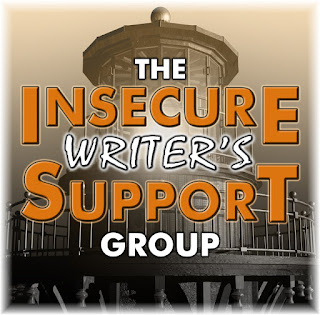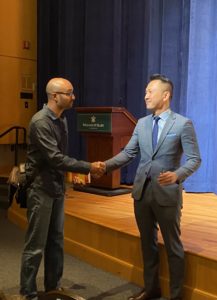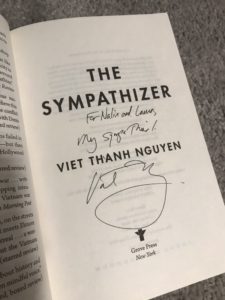I’ve been reading Gabriela Pereira’s book and website entitled The DIY MFA. Her advice to writers looking to homeroll their own MFA-like experience is divided into three parts: Write With Focus, Read With Purpose, and Build Your Community.
The section that has been most helpful to me so far as been the second. Pereira recommended approach is summarized in her blog post called “Essential Reading List: Must-Read Books for Your Writing Library“, in which she describes four categories of books that can inform a writer’s work: Competitors, Contextuals, Contemporaries, and Classics.
I went through her recommended exercise as described in her book, and was pleasantly surprised to find that it actually did help me structure my to-read list, and lead me to discover many books I hadn’t read but probably should.
If I could think of a book I already knew of that fit a category, I put it in, whether I had read it yet or not, and whether it was already in another category or not. Otherwise, I spent some time researching what might fit. My first cut is shared here, with have-read books in strike-through. Edit: I’ve also decided to update this list over time. Maybe someday it will deserve a page.
There’s some clear patterns in the whole. Firstly, I should probably be reading everything Kim Stanley Robinson, Ursula K. LeGuin, N.K. Jemison, and Alastair Reynolds ever wrote, with perhaps Anne Leckie and Iain M. Banks as high-value points in the mix as well. Secondly, a few books — like Jemison’s The Fifth Season and Arkady Martine’s A Memory Called Empire appear on multiple lists, and probably should be bumped way up on my priority list.
Time to get to work!
Edit: Last update to checked off books: 6/1/24.
Competitive Titles
Books/stories that “compete” directly with the stories you are actively trying to write. Same genre and category as your work(s) in progress and cover similar themes or subject matter.
This category was difficult, since I have many varied projects in progress and the list could grow rapidly out of control. I focused on science fiction, and particularly on my novel-in-progress, Rassam’s Eye as the anchor point.
Short Fiction Magazines:
- Asimov’s Science Fiction
- Magazine of Fantasy and Science Fiction
Ecological SFF:
- Forty Signs of Rain, Kim Stanley Robinson
- Three Californias, Kim Stanley Robinson
A Wizard of Earthsea, by Ursula K. LeGuin- Ministry for the Future, Kim Stanley Robinson
Dune, Frank HebertAnnihilation, Jeff Vandermeer- The Crystal World, J.G. Ballard
Sociological / Political / Spiritual :
The Fifth Season, N.K. Jemison- The Lathe of Heaven, Ursula K. LeGuin
- Parable of the Sower, Octavia Butler
Hyperion, Dan SimmonsDune, Frank HebertRevelation Space, Alastair Reynolds- The Unbroken, C.L. Clark
The Word for World is Forest, Ursula K. LeGuin
Contemporary Space Opera with overlapping themes of political intrigue, ethnic identity, colonization
- A Memory Called Empire, Arkady Martine
Ancillary Justice, Anne LeckieThe Quiet War, Paul McAuleyBlue Remembered Earth, Alastair Reynolds- Surface Detail, Iain M. Banks
Contextual Titles
All the books that put your current project(s) into context. This includes references and research materials. These contextual books might have a similar theme or subject matter as your own but fall in a different genre, or target a different group of readers. You might also read contextual books that use a particular storytelling technique, even though in terms of subject it is completely different from your own book.
The Dispossessed, Ursula K. LeGuin- The Sympathizer, Viet Thanh Nguyen
- The Nakesake, Jhumpa Lahiri
Americanah, Chimamanda Ngozi Adiche- The Road, Cormac McCarthy
Midnight’s Children, Salman Rushdie- Barkskins, Annie Proulx
- Lord of Light, Roger Zelazny
- Blue Skinned Gods, S.J. Sindu
- Zenogenesis, Octavia E. Butler
Green Grass, Running Water, Thomas King- Gods of Jade and Shadow, Silvia Moreno-Garcia
- The Unbroken, C.L. Clark
The Overstory, Richard PowersThe Devourers, Indrapramit Das
Contemporary Titles
Read a few recently published (within the last three years) books in your chosen genre each year. Be aware of new trends in the genre, the broader conversation around these works, and how they are marketed to the current audience of genre readers.
Note: I was most surprised by this category, specifically in how out-of-touch I’ve become with the genre. Of the Hugo and Nebula finalists for best novel in the last three years that looked interesting, I’ve read exactly none of them. Damn.
- A Memory Called Empire, Arkady Martine
- A Master of Djinn, Djeli Clark
- Network Effect, Martha Wells
- Gods of Jade and Shadow, Silvia Moreno-Garcia
- Gideon the Ninth, Tamsyn Muir
The Fifth Season, N.K. Jemison- The City We Became, N.K. Jemison
- The Calculating Stars, Mary Robinette Kowal
- Project Hail Mary, Andy Weir
- The Unbroken, C.L. Clark
- Black Sun, Rebecca Roanhorse
- The Poppy War, R.F. Kuang
Classics
Genre dependent, but you need to know what the founding assumptions and touchstones are of the genre(s) you’ve chosen to write in. You can’t (effectively) break what you don’t know, and you can’t reach readers who speak a language you don’t understand. You need to be able to get into the headspace of a genre to affect it.
I assembled this list using a rough merger/overlap of a few online lists (NPR Books, Goodreads, etc) of the best Science-Fiction novels of all time. I have not yet done the same with Fantasy. I seem to have done fairly well here so far, but some work left to do!
1984, George Orwell2001: A Space Odyssey, Arthur C. ClarkeBrave New World, Aldous Huxley- A Canticle for Leibowitz, Walter Miller
Childhood’s End, Arthur C. ClarkeThe Dispossessed, Ursula K. LeGuinDo Androids Dream of Electric Sheep?, Philip K DickDune, Frank Hebert- Fahrenheit 451, Ray Bradbury
The Forever War, Joe HaldemanFoundation, Isaac AsimovThe Hitchhiker’s Guide to the Galaxy, Douglas Adams- I, Robot, Isaac Asimov
The Left Hand of Darkness, Ursula K. LeGuinThe Moon is a Harsh Mistress, Robert Heinlein- Neuromancer, William Gibson
- Ringworld, Larry Niven
- Slaughterhouse Five, Kurt Vonnegut
- The Stars My Destination, Alfred Bester
- Stranger in a Strange Land, Robert Heinlein


